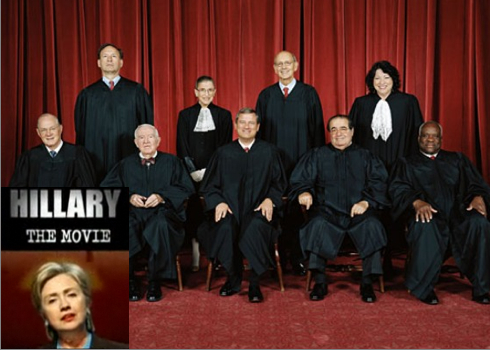In a ruling that has major implications for how elections are funded, the Supreme Court has struck down a key campaign-finance restriction that bars corporations and unions from pouring money into political ads.
The long-awaited 5-4 ruling, in the Citizens United v. FEC case, presents advocates of regulation with a major challenge in limiting the flow of corporate money into campaigns, and potentially opens the door for unrestricted amounts of corporate money to flow into American politics.
In the case at issue, Citizens United (CU), a conservative advocacy group, was challenging a ruling by the FEC that barred it from airing a negative movie about Hillary Clinton. CU received corporate donations and the movie advocated the defeat of a political candidate within 60 days of an election. CU argued that the FEC ruling violated its freedom of speech, and that the relevant provision of McCain-Feingold was unconstitutional.
The court overruled a 1990 decision that found that government can stop corporations from spending money on ads that urge the election or defeat of a candidate. It’s rare for the Supreme Court to overturn a precedent arrived at so recently.
The five conservative judges — Alito, Roberts, Scalia, Kennedy, and Thomas, ruled for Citizens United. The four liberal judges — Stevens, Breyer, Ginsburg, and Sotomayor, made up the minority.
Tom Goldstein of SCOTUSblog calls the decision “a small revolution in campaign finance law.”
At the heart of the ruling, now available here (pdf), is a judgment by the Court that the law cannot distinguish between corporations and individuals in prohibiting speech – so free speech rights that apply to the latter must also apply to the former. Kennedy writes for the majority:
Distinguishing wealthy individuals from corporations based on the latter’s special advantages of e.g., limited liability, does not suffice to allow laws prohibiting speech. Â It is irrelevant for First Amendment purposes that corporate funds may “have little or no correlation to the public’s support for the corporation’s political ideas.” Austin, supra, at 660. Â All speakers, including individuals and the media, use money amassed from the economic marketplace to fund their speech, and the First Amendment protects the resulting speech.
Sen. Russ Feingold (D-WI) warned last week that if the court found unconstitutional all efforts to ban corporations and unions from financing political ads, it would take the country “not just back to a pre-McCain-Feingold era, but back to the era of the robber barons in the 19th century.”
We’ll have more information on the court’s decision, and its potential ramifications, shortly…
Late Update: In a particularly hard-hitting quote, the good-government group Public Citizen declares:
Money from Exxon, Goldman Sachs, Pfizer and the rest of the Fortune 500
is already corroding the policy making process in Washington, state capitals and city halls. Today, the Supreme Court tells these corporate giants that they have a constitutional right to trample our democracy.
.
Late Late Update: Here’s the decision:
U.S. Supreme Court Campaign-Finance Ruling






